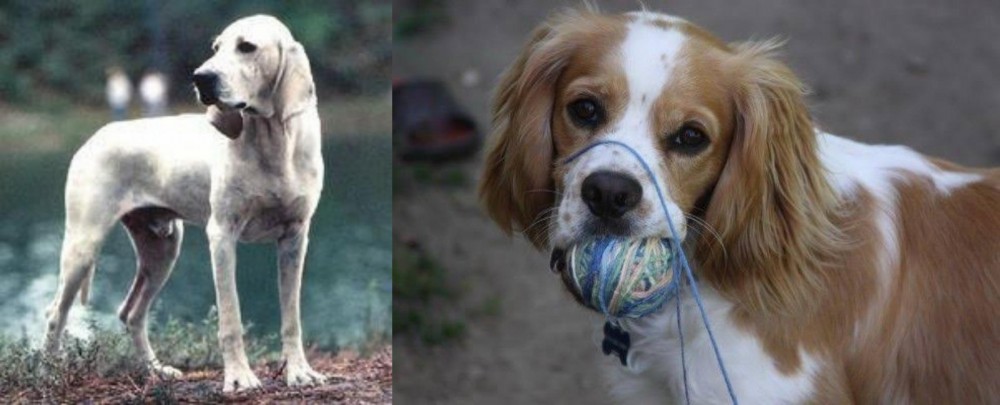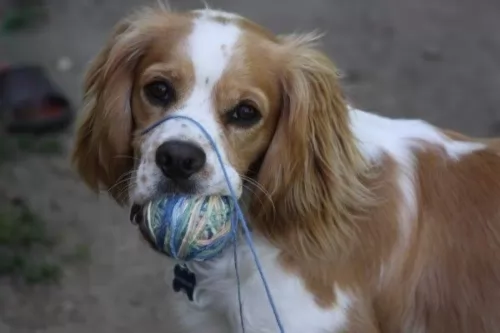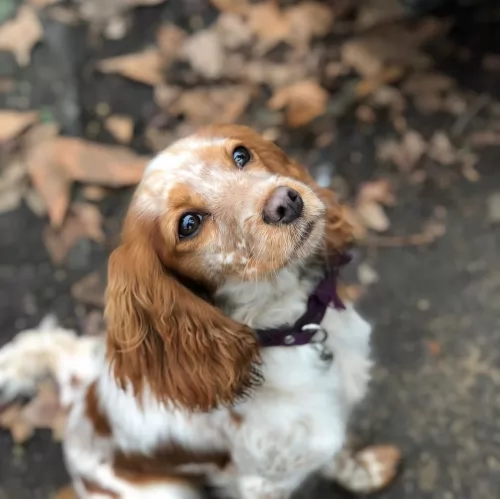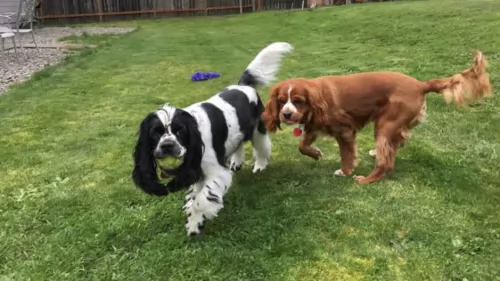 Petzlover
Petzlover Porcelaine is originated from France but Cockalier is originated from United States. Porcelaine may grow 20 cm / 8 inches higher than Cockalier. Porcelaine may weigh 16 kg / 36 pounds more than Cockalier. Both Porcelaine and Cockalier has almost same life span. Both Porcelaine and Cockalier has almost same litter size. Porcelaine requires Low Maintenance. But Cockalier requires Moderate Maintenance
Porcelaine is originated from France but Cockalier is originated from United States. Porcelaine may grow 20 cm / 8 inches higher than Cockalier. Porcelaine may weigh 16 kg / 36 pounds more than Cockalier. Both Porcelaine and Cockalier has almost same life span. Both Porcelaine and Cockalier has almost same litter size. Porcelaine requires Low Maintenance. But Cockalier requires Moderate Maintenance
 The Porcelaine is an attractive dog hailing from France. It is thought to be the oldest of the French scent hounds.
The Porcelaine is an attractive dog hailing from France. It is thought to be the oldest of the French scent hounds.
The dog also goes by the name of Chien de Franche-Comté. The dogs were developed for hunting purposes. It is believed to be an ancient dog breed, dating way back to the 1700s.
It is thought that dogs used to bring about the Porcelain are the Talbot Hound, the English Harrier, the Montaimboeuf, as well as some smaller Laufhunds of Switzerland.
The Club du Porcelaine was established in France in 1971 and the breed was recognized by the FCI in 1975. It is a rare breed virtually unknown outside of France.
 Known also as the Cockalier Spaniel, the Cockalier is a sweet crossbreed – a mix between the Cocker Spaniel and the Cavalier King Charles spaniel.
Known also as the Cockalier Spaniel, the Cockalier is a sweet crossbreed – a mix between the Cocker Spaniel and the Cavalier King Charles spaniel.
Both of these spaniels do have some differences. The Cockalier is a designer breed that hails from the USA. Because he is a hybrid breed the Cockalier isn’t recognized by the American Kennel Club, but as a hybrid, it is recognized by the American Canine Hybrid Club (ACHC).
 The Porcelaine has got such a gentle, amicable face that he looks like he wouldn’t hurt a fly.
The Porcelaine has got such a gentle, amicable face that he looks like he wouldn’t hurt a fly.
His interesting name comes from the fact that he has a shiny, gleaming single coat that looks like white porcelain.
He has a distinguished look to him with his slender neck, slender head with longish muzzle. The body is well proportioned, lean and muscular. Another noticeable feature of this dog is the long, floppy ears which can have a hint of orange. His nose is black and he has dark eyes and a long tail. He is a medium sized dog standing at between 53 to 58cm in height and weighs about 25 to 28kg.
Elegant and beautiful, the Porcelaine isn’t your usual looking dog. He is amicable and easy-going and always ready for a pat on the silky head.
His temperament, kindly and easy going, makes him the perfect pet for therapy purposes and for search and rescue work. He is a quiet, well behaved dog, indoors and out. He is an energetic dog and loves nothing more than a hunt and he has a keen sense of smell.
He loves being outdoors but is such a good friend of yours he can happily turn into a couch potato to be by your side.
 The Cockalier is a medium-sized dog standing at between 30 and 38cm in height and weighing roughly between 5 and 12kg.
The Cockalier is a medium-sized dog standing at between 30 and 38cm in height and weighing roughly between 5 and 12kg.
The coat of the Cockalier is silky and wavy. The coat is medium length and can be in colors such as golden, red, black or maybe white and brown.
The ears are fairly long and floppy, the eyes brown and expressive and the tail docked. If left, the tail is long and feathery.
The Cockalier is lively, gentle, intelligent and friendly with his human family, though he can be a little bit aloof with strangers.
He bonds very strongly with his family. They’re robust and are playful with children. They’re active dogs too and love nothing more than a hectic ball game. They don’t know when to stop and can become utterly exhausted if you don’t stop the game.
Have him trained and socialized and then he becomes even more amicable and he’s smart enough to learn basic commands without any trouble.
 The Porcelaine is a working, hunting dog but he is more than willing to become a companion animal, being loving and loyal to his human family.
The Porcelaine is a working, hunting dog but he is more than willing to become a companion animal, being loving and loyal to his human family.
He is a balanced, kind natured dog and can get on well with children and with pets in the home.
He enjoys his human family, and typical of hounds he is friendly, energetic and amusing. Bring this beautiful white dog into your home and start a wonderful, long, loving friendship with him.
 The Cockalier is such a clever dog and he wants to please. He just loves his human owners, protecting them against strangers. He doesn’t take too kindly to strangers, preferring to devote all his love and loyalty to those he knows.
The Cockalier is such a clever dog and he wants to please. He just loves his human owners, protecting them against strangers. He doesn’t take too kindly to strangers, preferring to devote all his love and loyalty to those he knows.
He just craves attention and wants to be in your vicinity all the time. He is also good with children and will get on well with other pets in the home.
Once you’ve had a Cockalier in your life, you’ll want to reconsider having one of them again as they make awesome pets and companions.
 The Porcelaine has so many good features, and good health is one. He is described as a truly healthy breed that can easily reach up to 14 years of age with good care.
The Porcelaine has so many good features, and good health is one. He is described as a truly healthy breed that can easily reach up to 14 years of age with good care.
As a Porcelaine owner, look out for some of the more common heath conditions such as cancer, bloat and skin infections.
A working, hunting type dog such as the Porcelaine can be devastated with hip dysplasia. It’s a disease that can be genetically passed on and if your dog has it,it should be spayed or neutered. The condition, where your pet becomes more and more reluctant to participate in exercise can be painful and debilitating.
There are different treatments available for pain relief and mobility.
The long, floppy ears of the Porcelaine can result in a tendency towards ear infections. Ear infections can be painful and frustrating and you’ll see your dog scratching his ears and shaking his head. The ears may be red inside and there may even be a discharge. Don’t allow your pet to suffer and get him to the vet.
 The Cockalier is a healthy dog breed and can reach between 12 and 15 years of age. Look out for common canine health issues such as hearing loss and ear infection and vision issues.
The Cockalier is a healthy dog breed and can reach between 12 and 15 years of age. Look out for common canine health issues such as hearing loss and ear infection and vision issues.
Cockaliers that have an ear infection will shake their head and scratch their ears. The inside of the ears may be red and there may be an unpleasant smell coming from the ears. Your pet will need to see the vet.
This is a common disease with King Charles Spaniels where the mitral valve wears out and leaks and is associated with a heart murmur.
The earliest sign of a leaking mitral valve is normally a heart murmur, but it doesn’t mean heart failure is imminent, but congestive heart failure will eventuallt occur. Your dog will tire when walking, be lethargic and also have a cough. It will definitely be time to see the vet.
 Porcelaines have a very high activity level and require lots of exercise - ball games and walks. Because of this, they aren't recommended for people living in small homes in the city. He will ideally suit life on a big property.
Porcelaines have a very high activity level and require lots of exercise - ball games and walks. Because of this, they aren't recommended for people living in small homes in the city. He will ideally suit life on a big property.
The Porcelaine Dog is a single coated dog with very short hair and is looked upon as being pretty low maintenance.
Apart from brushing him twice a week, to keep the coat shiny and healthy, wipe him down with a hound mitt to get rid of loose hairs and to remove dust.
Because of the long, floppy ears, clean the insides very gently to avoid dirt, moisture and wax buildup. There are veterinarian-recommended ear cleansers, but if you don’t like the idea of doing it yourself, the vet or groomer will do it for you when you take him to have his nails clipped.
Your beautiful Porcelaine dog needs the very best food there is so as to ensure he remains the healthy, shiny, lean specimen he is.
He can live a long, healthy life if you choose quality dog food packed with the right mix of vitamins and minerals. If you buy commercially manufactured dog food for him, it needs to be the high quality ones to ensure its properly formulated.
Your Porcelaine, like any other dog, wants consistency and simplicity. Home-made food is always an excellent choice for your pet’s diet. Boiled chicken, brown rice or pasta and spinach, sweet potatoes and carrots can be very healthy for him.
Chop it up and add it into the dry kibble a couple of times a week. Its providing him with some variety from the dry kibble and gives him a tasty treat.
Some raw meat added in occasionally will also ensure his coat and eyes remain bright and vibrant. Always make sure he has access to fresh, cool water.
 When you choose one of the commercially manufactured dog foods there are, you want to avoid those more inferior ones that have ingredients in them that can cause your dog to get sick.
When you choose one of the commercially manufactured dog foods there are, you want to avoid those more inferior ones that have ingredients in them that can cause your dog to get sick.
Look for the high-quality ones and choose the foods that have natural, wholesome ingredients in them. The vet can always help you with your decision to select a food that will of benefit to your pet.
Try to give your pet some good homemade food too such as some raw meat occasionally as well as boiled chicken, vegetables and brown rice. Fresh, cool water should be constantly available.
The Cockalier is going to require some brushing because he sheds quite a bit. Some dog owners prefer to get the Cockalier professionally trimmed. During grooming, check your pet over for any unusual lumps.
Your Cockalier will also need to have his nails trimmed, and because of the long ears, you will need to look inside the ears to ensure there is no redness and signs of infection.
Some dog owners don’t have the time or they don’t want to probe inside their pet’s ears and then a doggy-grooming-parlor can be a good idea as they do all this for you.
The Cockalier is an energetic dog, requiring a lot of exercise and games. These dogs love water games and will love you spraying him with water from the garden hose. Failing that, he’ll jump right into the swimming pool with you. Ball games are just up his street, and he will remind you every day that it’s time for his walk.